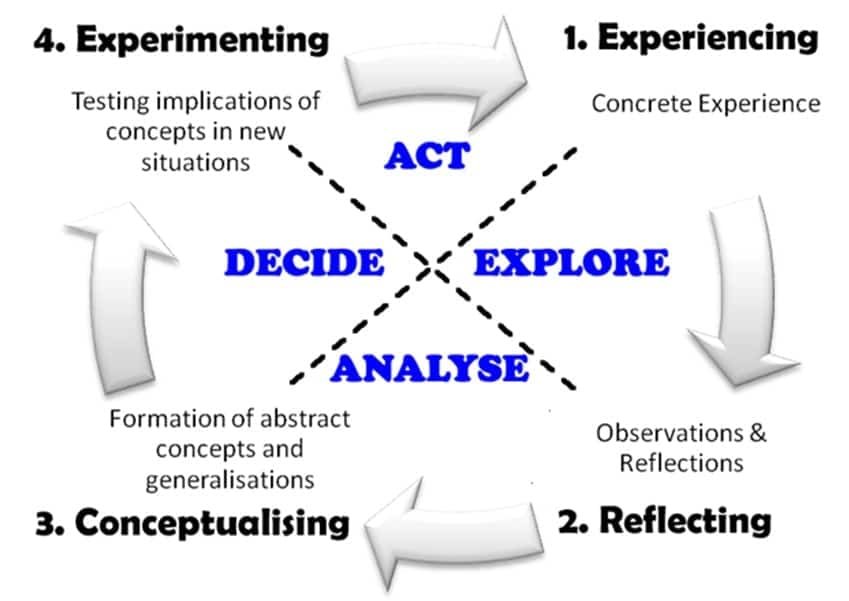Teaching & Learning
Understanding Reflection
DOWNLOADS
path: UNDERSTANDING REFLECTION…
What is reflection?
Reflection is a process of exploring and examining ourselves, our perspectives, attributes, experiences, actions and interactions. It helps us gain insight and see how to move forward.
Reflection attempts to move beyond simply describing events. It aims to
- be considered, thoughtful, analytical
- be honest – even when this is difficult or uncomfortable
- be rational and distanced (although it often deals with feelings and emotions, we try to look at them dispassionately)
- relate experiences to wider contexts, other perspectives and theoretical frameworks
Watch the video to learn more…
By far the most significant learning experiences in adulthood involve critical [reflection] —reassessing the way we have posed problems and reassessing our own orientation to perceiving, knowing, believing, feeling and acting”
Mezirow (1990) Tweet
Critical Reflection describes the process by which people learn to recognize how uncritically accepted and unjust dominant ideologies are embedded in everyday situations and practices”
Brookfield (2000) Tweet
Why are we so bothered about reflection?
Learning cannot happen without reflection. So – your log entries have to show more than a description of what happened. You have to reflect and analyse the situation if you are to learn from it. It helps us become better not just by improving our performance but also by preventing or reducing the adverse effects from critical situations.
It’s important to develop this skill throughout training because once you have developed it, it will serve you well for the rest of your working life. And it is the thing Educators look for – like your GP Trainer, your Educational Supervisor and at the ARCP panels.
Its power lies in being able to help you develop your understanding of the way you learn, the subjects you are studying and to define your longer-term goals. It can help to promote critical thinking and problem-solving skills, both of which are key to academic success. But it has further uses that relate to life skills: it is an essential part of personal development and prepares you for the world of work, encouraging you to develop the habit of analysing your actions or events and considering the consequences.
Gillett, Hammond and Martala, 2009 Tweet
“It is not sufficient simply to have an experience in order to learn. Without reflecting upon this experience it may quickly be forgotten, or its learning potential lost. It is from the feelings and thoughts emerging from this reflection that generalisations or concepts can be generated. And it is generalisations that allow new situations to be tackled effectively.”
Gibbs (1998) Tweet
How reflection leads to Transformative Learning
Mezirow describes transformative learning as “learning that transforms problematic frames of reference to make them more inclusive, discriminating, reflective, open, and emotionally able to change.” To me, transformative learning is something that makes a big difference to the way you now think about things compared to your previous frames of reference.
So, what must happen for a person to change their view of the world? Mezirow believed that this occurs when people face a “disorienting dilemma.” Disorienting dilemmas are experiences that don’t fit into a person’s current beliefs about the world. When faced with a disorienting dilemma, people are forced to reconsider their beliefs in a way that will fit this new experience into the rest of their worldview. This often happens through “critical reflection” in the context of dialogue with other people.
Experience
Reflect
Conceptualise
Apply
What sorts of things should I reflect on? (or write about)
The kinds of things that people reflect on tend to fall into 3 broad categories:
- specific events e.g. an activity or task in practice
- critical incidents – something which had a significant impact on you (positive or negative)
- longer processes e.g. a project, assignment, course or your progress in something in a post
But I reflect in my head all the time! Why do I have to write it down? Is that the only way to reflect?
Yes, you’re right – a lot of people reflect in their own minds all the time. And that is definately a form of reflection. You can have a dialogue with your own mind whilst you are IN and activity like a consultation (we call this Reflection IN Action) or you can have a dialogue with your own mind AFTER the event (we call this Reflection ON Action).
However, the problem with have a dialogue with our own minds is that firstly, these internal discussions usually happen briefly, in unprotected moments and are therefore over very quickly. And because they are over so quickly, we don’t go as deep as we could on the reflection front. Also, your own mind in this “quick state” is unlikely to become your CRITICAL FRIEND and is more likely to find a justification and be dismissive of any critical event.
Of course, you can have a conversation with a ‘critical friend’, mentor or tutor and this is indeed another good way of reflecting. But you won’t always have a mentor, tutor or ‘critical friend’ available to you. And sometimes we need to reflect there and then – so this solution of having an external somebody, whilst extremely helpful, is just not there at the right time.
Reflection is done as writing, SLOWS us down and in doing so, allows us to probe our thoughts and feelings and develop or conclusions (or reflections) more thoughtfully. Hence, the need for GP trainees to write about events and their reflections in the ePortfolio by way of learning log entries.

Thinking about what has happened is part of being human. However, the difference between casual ‘thinking’ and ‘reflective practice’ is that reflective practice requires a conscious effort to think about events, and develop insights into them. Once you get into the habit of using reflective practice, you will probably find it useful both at work and at home.
How to reflect - some helpful tips
Reflection is a type of thinking aimed at achieving better understanding and leading to new learning. All of the following are important aspects of the reflective process:
- Making sense of experience
We don’t always learn from experiences on their own.. Through reflection, we can analyse experience, actively attempting to ‘make sense’ or find the meaning in it. This should lead to learning. - ‘Standing back’
It can be hard to reflect when we are caught up in an activity. Reflection provides a way of ‘standing back’ from the emotions and quick judgments made at the time, in order to develop a clearer view or perspective. - Repetition
Reflection involves ‘going over’ something, often several times, in order to explore what happened from different points of view. - Deeper honesty
Reflection is associated with ‘striving after truth’. Through reflection, we can acknowledge things that we find difficult to admit at the time: feelings or thoughts we might have chosen to ignore at the time, particularly if we felt unsure or worried about what others might think. - ‘Weighing up’
Reflection involves being even-handed, or balanced in judgement. This means taking everything into account, not just the most obvious. - Clarity
Reflection can bring greater clarity, like seeing events reflected in a mirror. This can help at any stage of planning, carrying out and reviewing activities. - Understanding
Reflection is about learning and understanding on a deeper level. This ncludes gaining valuable insights that cannot be just ‘taught’. - Making judgements
Reflection involves an element of drawing conclusions in order to move on, change or develop an approach, strategy or activity.
https://www.qmu.ac.uk/media/5533/reflection-2014.pdf
4 Models of Reflection
There are lots of models of reflection. They’re all based around Kolb’s Learning Cycle (see below). The one I think most GP trainees will find helpful is the ISCE model because it is straight forward, easy to remember and defines not acceptable, acceptable and excellent levels of reflection. Gibbs cycle is also good, especially for events that are emotionally charged. Some of you may prefer to use Johns or Borton’s model – but personally, I find the numerous questions under each of the headings a bit too reductionistic.
ISCE
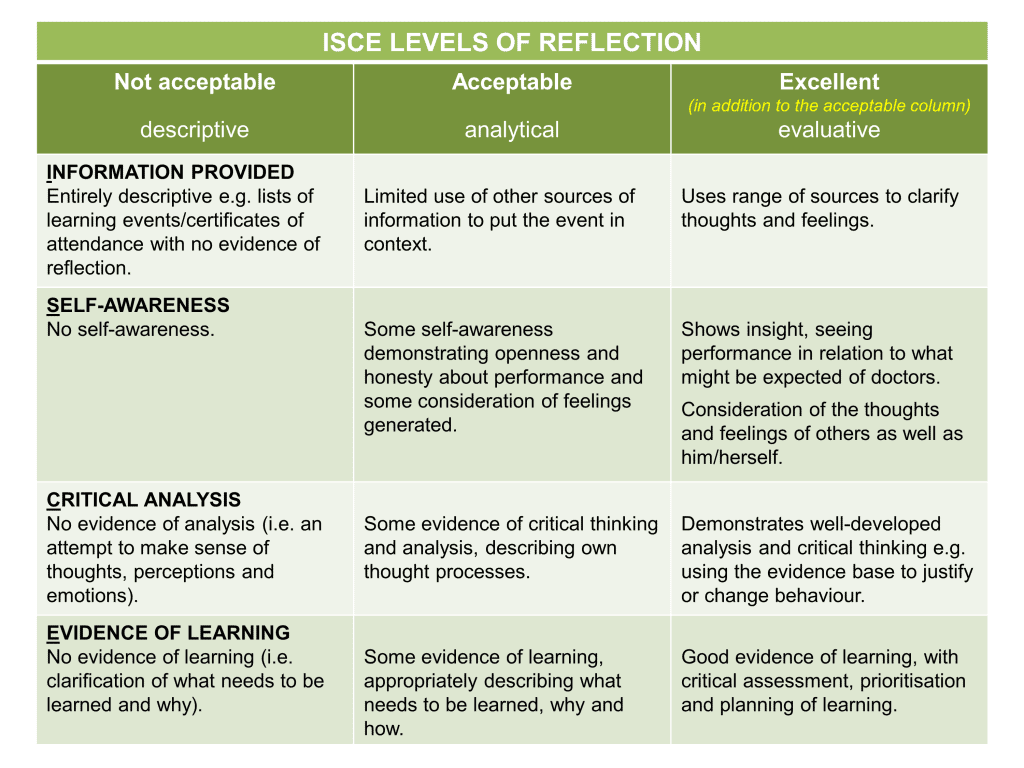
GIBBS' CYCLE

JOHNS' MODEL
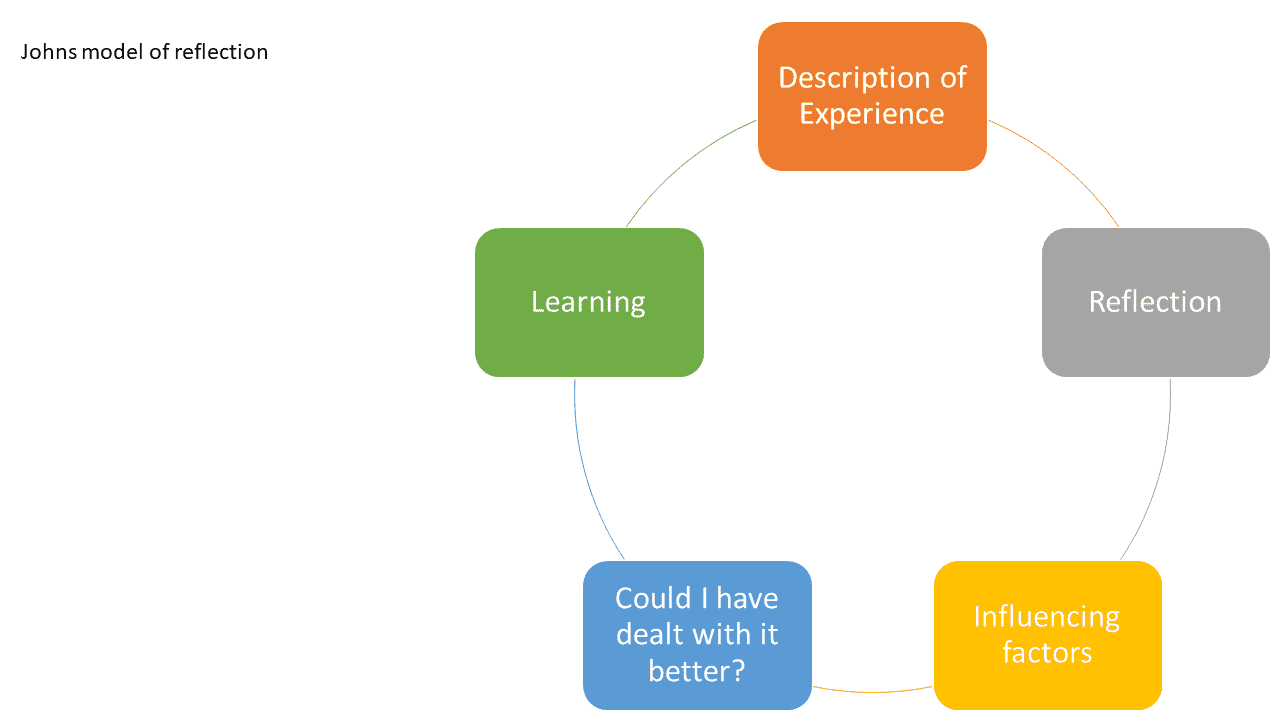
BORTON'S MODEL
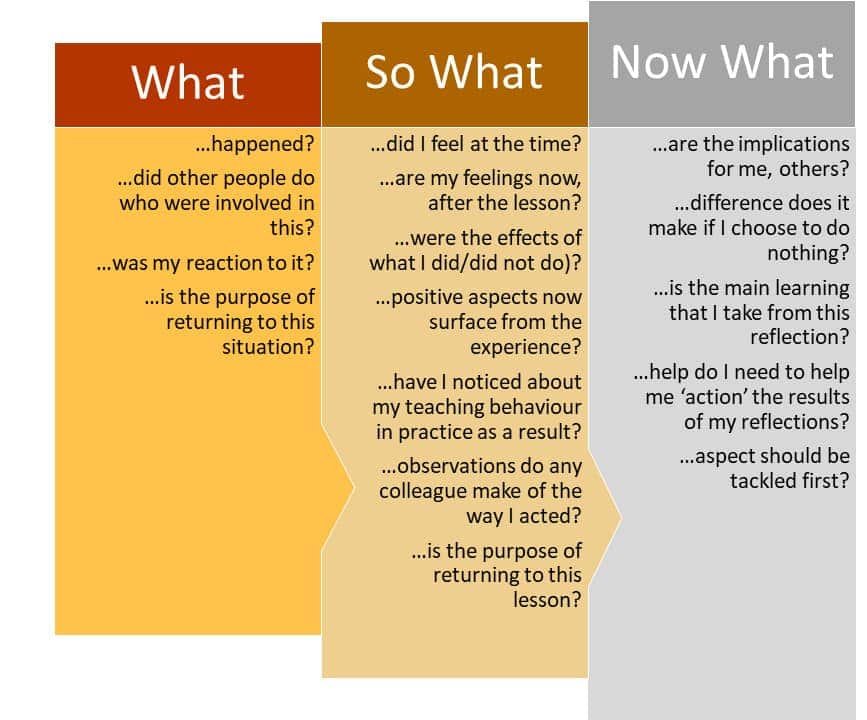
Kolb's Learning Cycle
Simple version
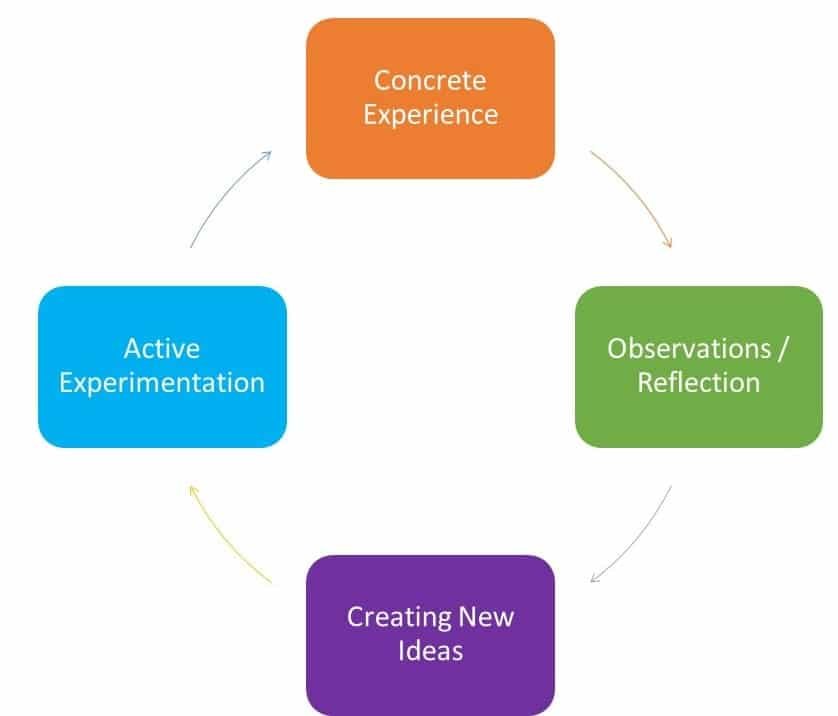
Detailed version
